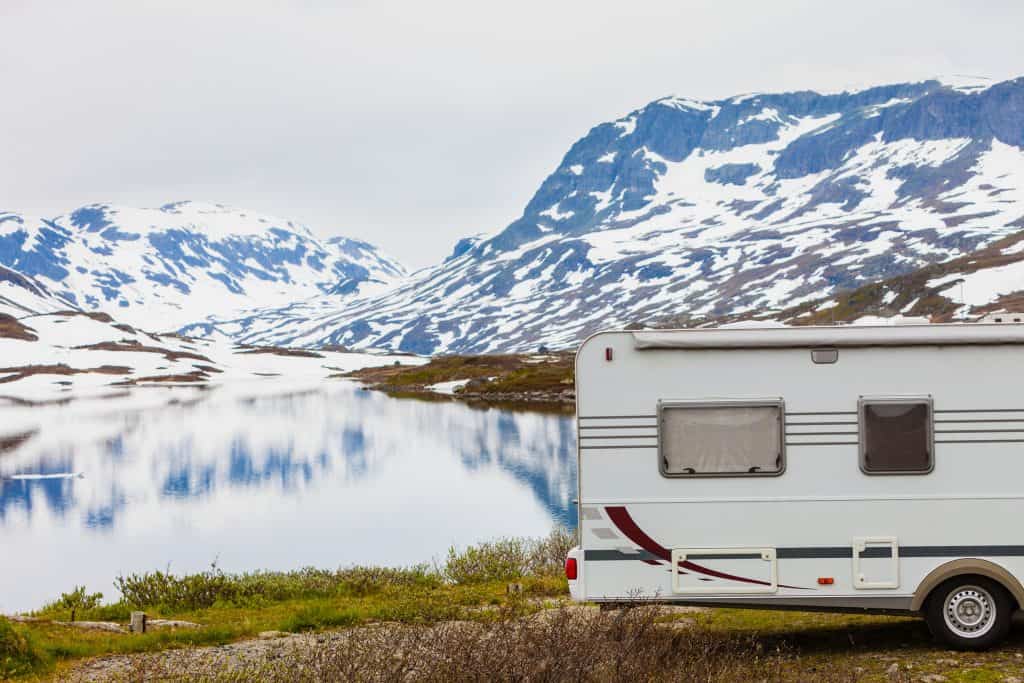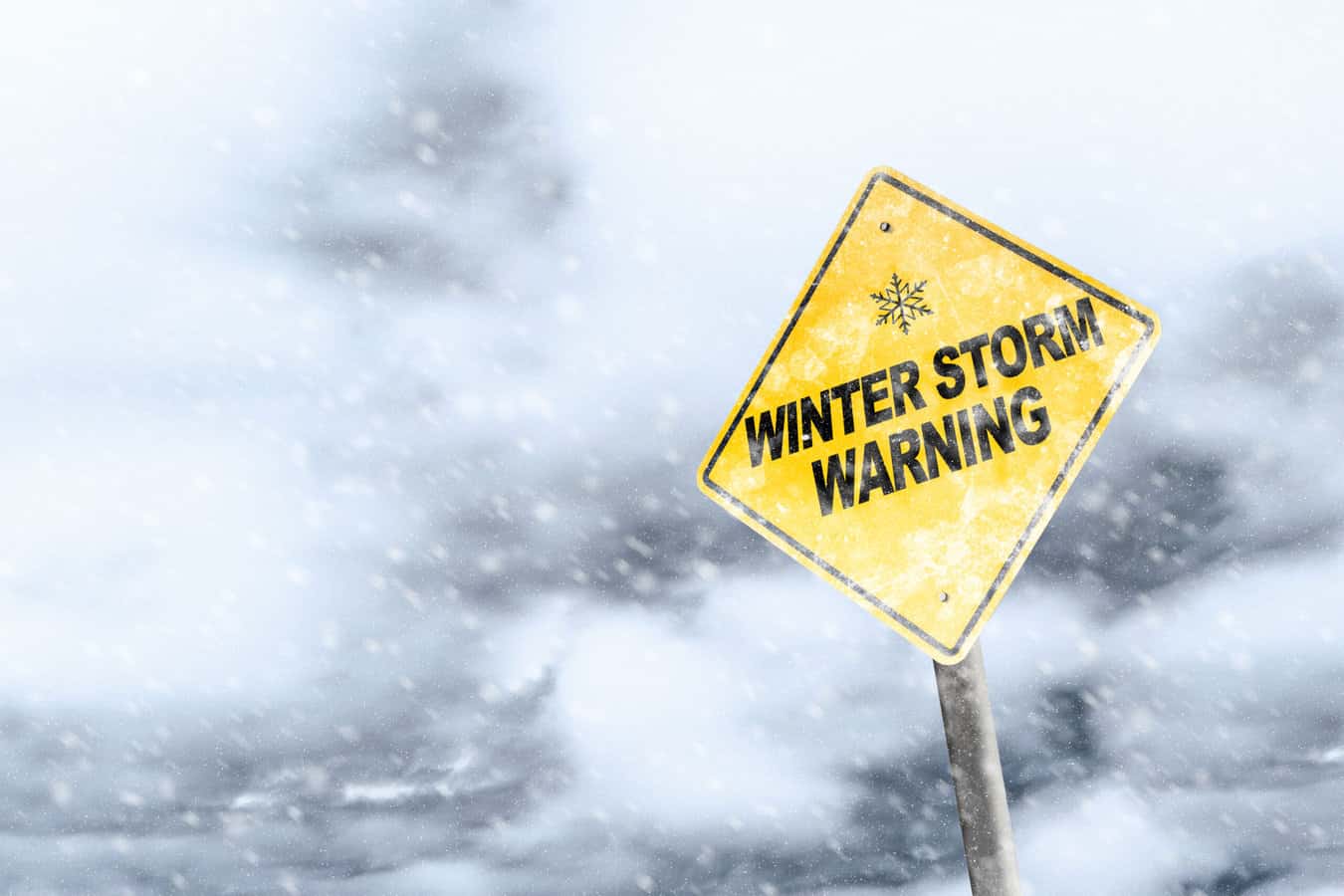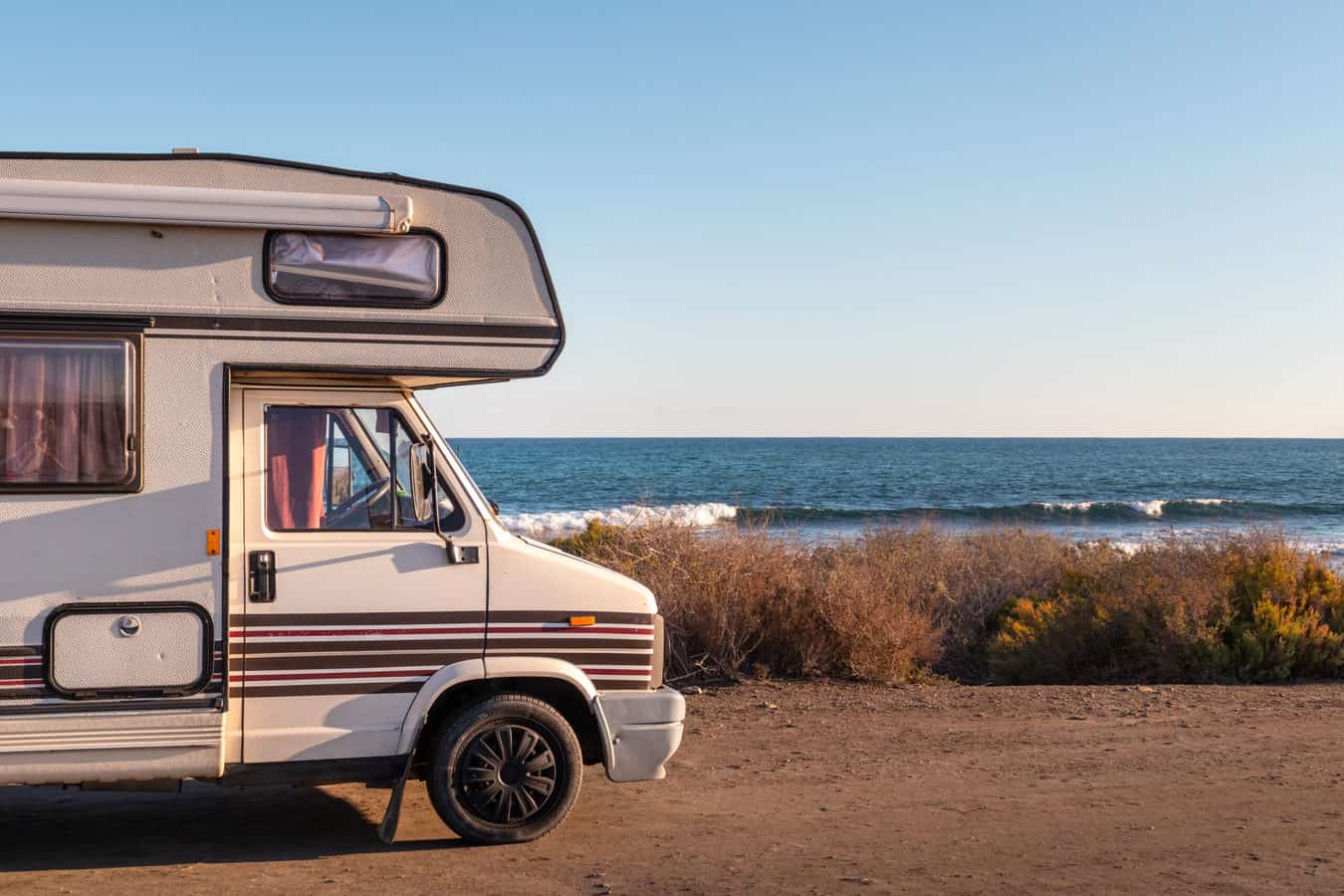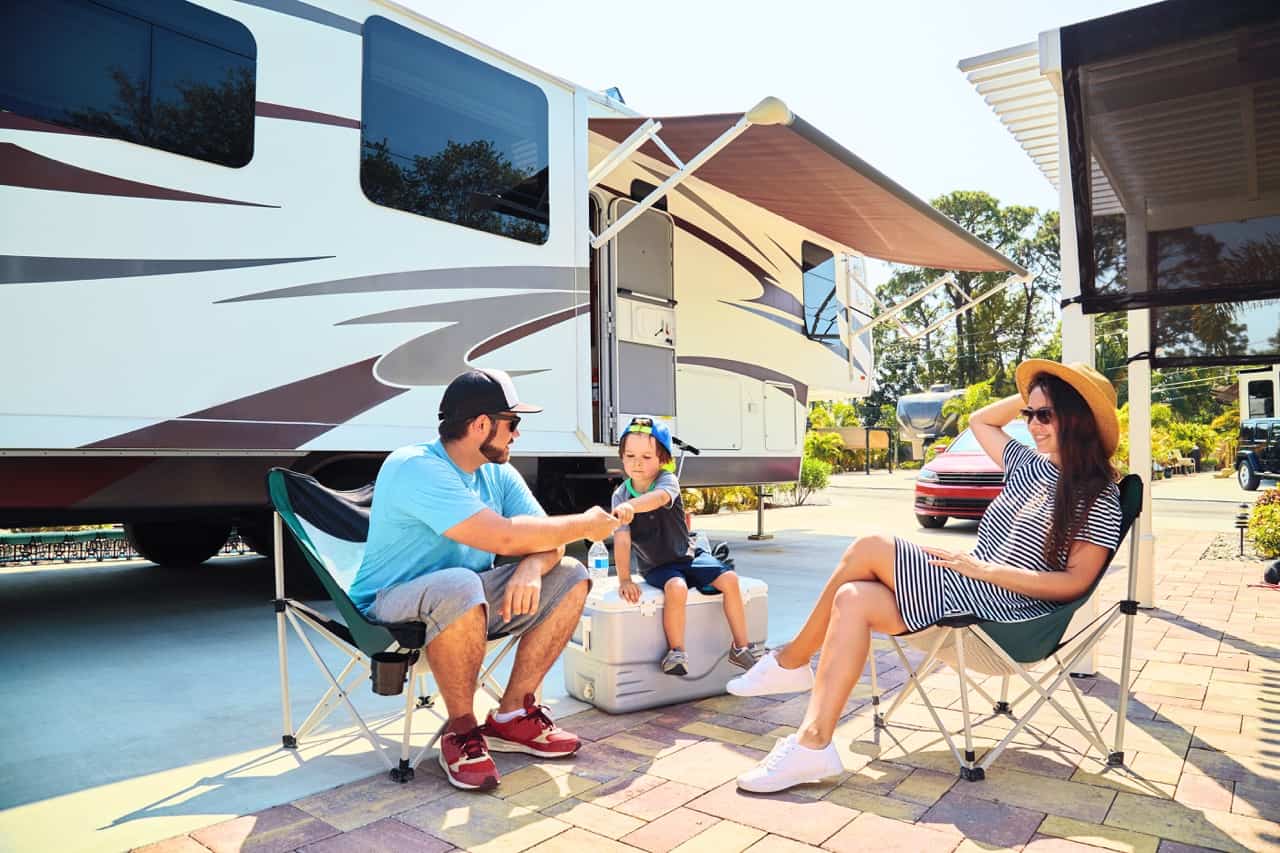
If you’re considering insurance for your travel trailer, you probably want to know exactly what your insurance policy will cover. The stress of getting into an on-road accident or having your trailer damaged by a freak rainstorm can be alleviated by the peace of mind (and wallet) that having travel trailer insurance can bring.
Though there is no definitive standard for what a typical travel trailer insurance policy looks like, most travel trailer insurance covers many risks that auto insurance does. This includes collision, comprehensive and liability coverage, and the option to add additional protection for personal items.
Let’s take a look at some of the types of insurance available for travel trailers, some of the top insurers for travel trailers, and the overall costs and benefits of having a specific travel trailer insurance policy.
Types of Travel Trailer Insurance
The first thing to keep in mind is that most states do not require a travel trailer to be insured separately from the towing vehicle. Because travel trailers are not drivable themselves, they require being pulled by another vehicle. The liability insurance that covers the lead car, truck, or SUV should extend to the towed trailer.
However, liability coverage provided by your automobile insurance only covers the costs involved with damages you cause to someone else. In the event that your property is also damaged, or the person who damages your trailer is under- or uninsured, liability insurance coverage doesn’t protect you.
If this scares you, you aren’t alone. After shelling out some serious funds to get your travel trailer road-ready, the thought of having that money wasted by damages you can’t afford to repair is devastating.
Thankfully, you can protect your assets by getting additional insurance meant specifically for your travel trailer and its unique needs. Deciding what kind of coverage you need is easier when you understand the different types of insurance available and what they are meant to protect.
- Collision Coverage: This type of insurance covers damages incurred through an accident (like when your vehicle collides with another vehicle whether both vehicles are moving or one of them is parked). Collision coverage protects your travel trailer regardless of who is at fault.
- Comprehensive Coverage: When your vehicle is damaged for reasons unrelated to an accident, comprehensive coverage is your new best friend. This policy can pay for damages related to weather conditions, like high winds, or random events, like falling trees or branches. Comprehensive coverage can also protect you from theft, vandalism, and fire.
- Contents Coverage: Think of “contents” as the contents of your travel trailer. Personal belongings like laptops, jewelry, and appliances are covered under this type of policy. Some contents may be covered under a comprehensive or collision policy and other items may be covered under your homeowner’s insurance.
- Medical Payments Coverage: If you are in an accident, liability insurance takes care of the other vehicle and its occupants. Medical payments coverage helps to cover the medical costs you or your passengers may incur if you are at fault in an accident and also injured.
- Underinsured or Uninsured Coverage: When an accident occurs and you are not at fault, there is no guarantee that the other driver is legally insured or that his insurance is adequate to cover the damages you sustain. This supplemental coverage protects you if the at-fault driver isn’t sufficiently insured.
- Campsite and Vacation Liability: Accidents don’t just happen on the road. If a fellow camper is injured in your travel trailer, or around it, when you are parked, this kind of policy can keep you from having to pay out of pocket for medical or other expenses. Some comprehensive or collision policies may also include this type of coverage.
- Emergency Expenses Coverage: Part of the allure of a travel trailer is having your sleeping and living space with you while you travel. If your trailer comes unhitched and rolls down a hill (or off a cliff!) or the door of your travel trailer simply gets damaged and won’t open, then you don’t have a place to sleep and you may not be able to access your belongings. Emergency expenses coverage can help with hotel and other costs.
- Health Insurance: While not directly related to your travel trailer, it is important to make sure that you have health insurance while traveling. Having a health scare at home is hard, but having a health problem when you’re miles from your doctor, family, and friends can be even worse. Making sure that you have healthcare coverage while on the road is just smart.
- Pet Insurance: If you’ve always dreamed of reenacting Steinbeck’s Travels with Charley, or you just love having your pet on the road with you, you aren’t alone. Did you know that your pet can be insured while you’re traveling in case something happens to you? Many insurers offer policies for your pet that help your buddy get home if you are injured or unable to care for him yourself. These policies can also assist with veterinary services, dog walkers, or pet sitters if the need arises. You may have to have your pet’s vaccination and health record on hand to sign up for this type of policy.
Which Insurance Company is Best?
When you have a better idea of what kind of protection you need for yourself, your travel trailer, your stuff, and any passengers while on the road, you can begin to shop around for insurance companies that can offer these types of policies.
When shopping for a travel trailer insurance policy, you want to be sure that you’re dealing with a reputable insurer so that if you need to cash in on that policy, you won’t get bound up in red tape, or worse, stuck without coverage when you thought you had it.
As with any big purchase, it helps to ask around. If you don’t have any close friends or family members who use travel trailers, don’t worry. There are lots of discussion forums for RVers who are happy to give you advice or share their firsthand experiences with insurance companies while on the road.
You can also look online for travel trailer insurers, and a good place to start is by visiting consumer sites that allow customers to rate and give feedback on their insurance experiences.
We’ll also give a list here of some of the most popular insurance companies that seem to consistently make the rankings on consumer sites and insurance reviews. Keep in mind that insurance is a personal choice and what’s considered the “best” depends on what you’re looking for in terms of cost, coverage, and flexibility.

In no particular order, here are some of the most well-known insurance companies for insuring your travel trailer:
1. USAA: Although this insurance company limits their availability to members of the military and their families, USAA has a great reputation if you fit into that category.
As far as travel trailer insurance goes, USAA has very specific guidelines as to what they consider a “travel trailer,” and for vehicles that don’t fit their definition, they may refer you to a partner insurer.
2. Progressive: Known for low rates and low deductibles, Progressive also features an option for reduced deductibles when you go for at least a year without making a claim.
There are many optional add-on policies that cover other features, like roof replacement and even pest coverage. Progressive also has coverage options that include travel in Mexico if you’re planning to vacation outside the US.
This insurer also partners with USAA to cover some of their recreational vehicle policies. However, there can be price differences when going through USAA, so be sure and check out Progressive insurance direct as well.
3. State Farm: A highly rated nationwide insurer, State Farm consistently has high customer service ratings.
While their website doesn’t give much information on insurance specific to travel trailers and their app isn’t as highly rated as some other insurers, State Farm agents are notoriously helpful and available. They also provide coverage for personal items and offer helpful information about caring for and maintaining your recreational vehicle.
4. Nationwide: Another well-known insurer, Nationwide insurance offers a huge number of discounts when you sign up for a policy, which increases your odds of qualifying for one or more. They also offer a wide range of insurance coverage options for travel trailers including custom equipment like aftermarket parts and awning replacement coverage.
5. Farmers: Covering a wide range of options for RVs, Farmers also has a “Stationary Travel Trailer” program that covers travelers who live in their travel trailers full- or part-time. All of their optional coverages for RVs also apply to travel trailers and they have a well-rated app if you prefer to find information or even file a claim right from your phone.
6. Good Sam RV Insurance: While Good Sam has mixed reviews on many RV forums, they are also one of the most popular insurance companies for RVs. Good Sam agents are well-versed in RV culture and proactive in reaching out to customers and guiding first-time RVers and full-timers to coverage options that are right for them.
7. National General: When an insurance company has been around for almost 100 years, it must be doing something right. National General has high customer satisfaction rates and lists a wide variety of discounts. Some of their coverage options, like personal belongings coverage, comes with every policy at no additional cost.
8. The Hartford: Well-known among baby boomers for partnering with AARP, Hartford also offers travel trailer and motorhome insurance with a variety of coverage options. Medical payments, towing and labor costs, vehicle rental costs, and property damage coverage are all available.
They also offer discounts for being a member of some RV clubs, taking a defensive driving course, or using your travel trailer seasonally. Many customers find that The Hartford offers quick response times which is helpful in a crisis.
9. Geico: Anybody who’s seen their commercials knows that a fifteen-minute call could save you fifteen percent, but did you know that Geico also insures travel trailers? Geico offers an “enhanced Towable RV” policy that includes options like total loss replacement, vacation liability, emergency expense coverage, and a special windshield deductible.
10. Safeco: With highly rated customer service, Safeco offers a number of policies for RVers whether you use your travel trailer full-time, part-time, or just on the occasional weekend.
They also offer optional coverages like claims-free cash back, accident forgiveness, and pet coverage and have customer service representatives available 24/7 for questions or claims processing.
In addition to these companies, there are many websites like RVinsurance.com that will comparison shop for you to help you find the best price and compare rates side by side.
It is important to note that coverage options within any insurance company can vary by state, and most insurances offer bundling discounts when you have multiple insurance policies with them, like automotive or homeowner’s insurance.
Travel Trailer Insurance Costs

As with insurance coverage policies, the price of travel trailer insurance varies due to several factors. The level of coverage you want, the make, model and year of your travel trailer, your driving history, and how often you travel can all affect how much you will pay.
Many travel trailer policies are as low as a couple of hundred dollars a year, but with maximum insurance coverage, that number can go up dramatically.
Don’t skimp on the insurance that you may need just to save a couple of bucks. That could cost you much more in time, money, and headaches if you are in an accident, if your travel trailer sustains excessive damage, or if your travel trailer is stolen.
Shop around, ask about discounts, and don’t be afraid to check up on different companies and their customer satisfaction ratings. While it is appealing to get information and sign up online, sometimes speaking with an agent directly can help you get the best coverage at a great price.
Travel Trailer Insurance Benefits
The benefits of having travel trailer insurance are innumerable, but we’ll list just a few of them for you.
Protecting your investment with insurance lets you relax on the road. If a storm damages an awning, knowing it’s covered makes it a much smaller problem and lets you enjoy your vacation stress-free.
Good-quality insurance also saves you money. When looking at insurance numbers like deductibles and premiums, it can be hard to see the payoff when you only concentrate on what it’s costing you.
It’s much easier to see the value when you compare those deductibles and premiums to the cost of replacing an awning or a generator, not to mention the price of repairing body damage, replacing windows and glass, or paying out of pocket for medical costs.

Another huge benefit of travel trailer insurance is getting to enjoy the convenience of traveling your way, on your terms. Having your travel trailer insured means that you don’t have to worry about someone else’s choices on the road affecting you in a negative way.
If an uninsured motorist damages your travel trailer, no worries, you’ve got coverage. When a nosy campground neighbor wants to check out your ride and slips on your steps, you’re taken care of.
How about driving back from dinner to your campground to find that your generator has been stolen? With the right insurance policy, even that won’t derail your dream vacation.



